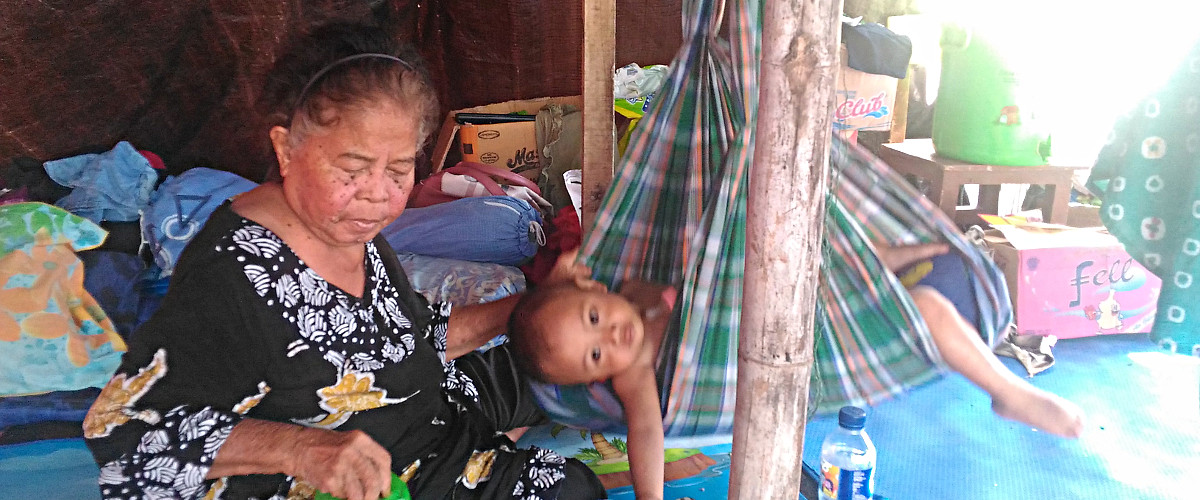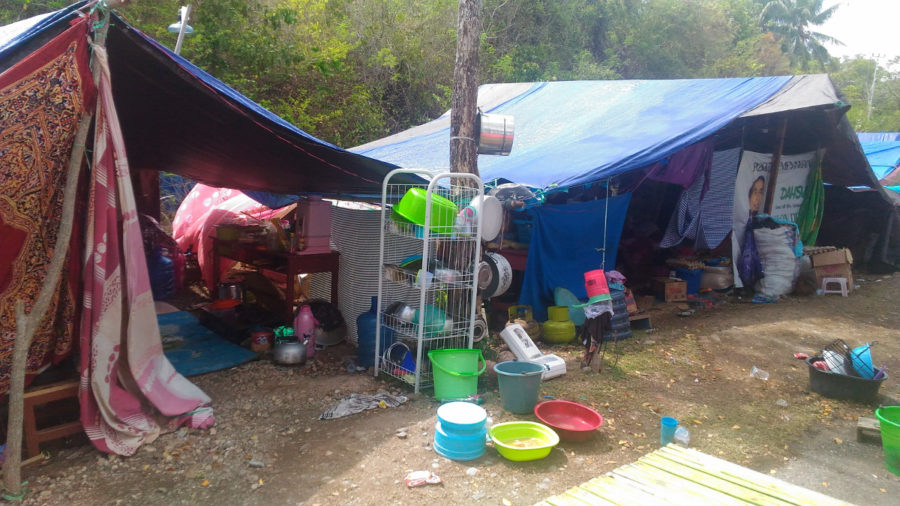 Run as fast as possible away from the ocean. This was the only thing Rikmawati had on her mind after she heard a neighbour screaming, “The water is rising … water rising… the water is rising!” Repeating these words over and over again in her head she kept running tirelessly, barefoot, while holding her grandson and ignoring the pain in her feet rushing over stones. She decided to stop after she felt finally at a safe distance from the shore.
Run as fast as possible away from the ocean. This was the only thing Rikmawati had on her mind after she heard a neighbour screaming, “The water is rising … water rising… the water is rising!” Repeating these words over and over again in her head she kept running tirelessly, barefoot, while holding her grandson and ignoring the pain in her feet rushing over stones. She decided to stop after she felt finally at a safe distance from the shore.
“It all happened so fast, less than five minutes after the earthquake, the sea level was rising. I’m lucky my neighbour screamed, telling me to run quickly. I might have been dead otherwise,” reflects the lady of Bugis descent.
Rikmawati is one of around 200 survivors who are now staying in tents along the coastal road of Tanjung Karang beach, Donggala Regency, about 45 kilometres from Palu city. The 7.5 Richter Scale earthquake on September 28 triggered a tsunami. The day has become an unforgettably terrifying experience for many. “There were big earthquakes in the past but not like that day. So many houses collapsed, and then the sea water level rose. I was so scared. My house was destroyed but Alhamdulillah my grandson and I survived,” continues Rikmawati.
It has been exactly a month now, Rikmawati and all residents of Tanjung Karang village, the majority of whom are Bugis people, now live in tents. Hot weather during the day, cold at night, and plenty of mosquitos make the refugees, especially elderly and children, vulnerable of getting ill. The insufficient sanitary conditions in camps lead to many refugees complaining about diarrhea and skin irritations.

The condition of displaced people in Tanjung Karang, Donggala District — far from the city and one of the many evacuation points — receives less attention. Media coverage and logistics are mostly targeted to more accessible displacement camps in town. But remote areas with difficult road access are out of sight. Together with a team of volunteers from the network of Caritas Indonesia and the Commission of Social and Economic Development (PSE) of the Diocese of Manado at Santa Maria coordination post, Jesuit Refugee Service (JRS) has joined efforts to reach these distant and isolated areas to serve those displaced with logistics, health care services and psychosocial activities.
Between October 11 and 30, JRS provided psychosocial activities at 21 locations to 1,145 children in Donggala, Palu and Sigi, as well as supported the PSE Diocese of Manado, which provided medical support and health services. JRS continues to be engaged in supporting needs assessments in seven locations for upcoming response programmes including shelter and livelihood by CRS and Dompet Kemanusiaan Media Group, as well as developing its own psychosocial response activities for schools in earthquake affected communities.
What happened?
On September 28 at 6:02 pm local time, a shallow, large earthquake struck in the neck of the Minahasa Peninsula, Indonesia, with its epicenter located in the mountainous Donggala Regency, Central Sulawesi. The magnitude 7.5 quake was located 77 kilometres (48 miles) away from the provincial capital Palu and was felt as far away as East Kalimantan and Tawau, Malaysia.
Following the main shock, a tsunami alert was issued for the nearby Makassar Strait. A localised tsunami struck Palu, sweeping shore-lying houses and buildings on its way. The combined effects of the earthquake and tsunami led to the deaths of at least 2,250 people, over 1,300 persons disappeared, over 4,600 were injured and 223,751 people are staying in displacement sites. This makes it the deadliest earthquake to strike the country since the 2006 Yogyakarta earthquake, as well as the deadliest earthquake worldwide so far in 2018.
By Zainuddin, JRS Indonesia
If you would like to support JRS’ work in Central Sulawesi, please make a donation to:
Bank Name : OCBC NISP
Bank address : Jl Kaliurang Km 5,2 Yogyakarta 55222, Indonesia
Acc Name : Yayasan Jesuit Refugee Service Indonesia
Acc No : 231-8100-27285
Currency : USD or EUR
Bank Sort Code : NISPIDJA

